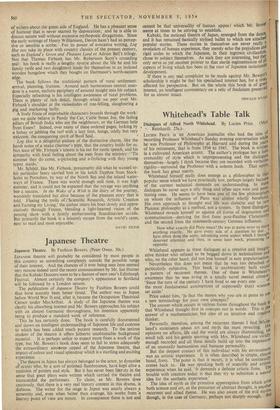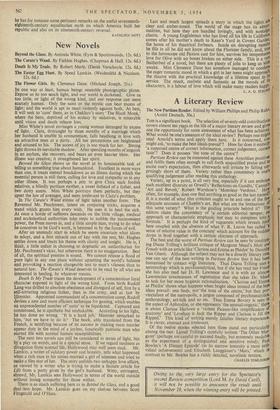Whitehead's Table Talk
Dialogues of Alfred North Whitehead. By Lucien Price. (Mitir A Reinhardt. 25s.) LUCIEN PRICE 15 an American journalist who had the idea of recording Professor Whitehead's Sunday evening conversation while he was Professor of Philosophy at Harvard and during the years of his retirement, that is from 1934 to 1945. The book is writteo in a cultivated American accent. The author's prologue has a lush orotundity of style which is unprepossessing and the dialogues themselves—largely I think because they are recorded with verbatira rigidity—surround the Professor with a solemn hush. That apart, the book has great merits. Whitehead himself really does emerge as a philosopher in that popular sense which we have practically lost, perhaps largely because of the current technical demands on understanding. In the dialogues he never says a silly thing and often says wise and pone' trating ones. He seems to have been one of the few philosophei, on whom the influence of Plato was almost wholly beneficial. His own approach to thought and life was dialectic and he stoe Platonic philosophy as a method, not a system. In these dialogues, Whitehead reveals himself as against all forms of dogmatism nod systematisation—deriving the first from post-Pauline ChristianitY and the second from the nineteenth-century German influence.
Now what exactly did Plato mean? He was at pains never to meal anything exactly. He gave every side of a question its due. have often done the same, advancing some aspect which I though' deserved attention and then, in some later work, presenting its opposite.
Whitehead appears in these dialogues as a creative and imagill; ative thinker who refused to be bogged down in technicalities am' who, on the other hand, did not lose himself in easy popularisation. Nevertheless this does not mean that he was too detached 01, particularly subjective. This book is unobtrusively built rouna a pattern of recurrent themes. One of these is Whitehead's awareness that he was living in a totally novel mental climate., `Since the turn of the century I have lived to see every one . . • 0` the most fundamental assumptions of supposedly exact science set aside.' Price asked him, 'Is that the reason why you are at pains to ose a new terminology for your own concepts?' The answer which occurs in various forms throughout the book iS that Whitehead thought first in concepts not in words. This is the answer of a mathematician, but also of an intuitive and creative thinker. Personally, therefore, among the recurrent themes I find White' head's statements about art and myth the most revealing. His opinions on affairs, life and the world are always illuminating, h'' small talk and his gentle sparring with Mrs. Whitehead are vividlY enough recorded and all these details build up into the impression of an unusually harmonious and humane personality. But the deepest contact of this individual with his environment was an artistic experience. It is often described in simple, ahnost banal, form. The point is that it recurs, it is what he continualtY comes back to. He was speaking both of scientific and artistic experience when he said, 'It demands a definite artistic form. TO, trouble with creators today is that they try to substitute a mow idea for the aesthetic experience.' The idea of myth as the primitive apperception from which arise both science and art, as the precursor of abstract thought, is another recurrent and allied theme. He was also aware of the evil mYths: though, in the case of Germany, perhaps not sharply enough. LW' he has for instance some pertinent remarks on the useful seventeenth- eighteenth-century equalitarian myth on which America built her republic and also on its nineteenth-century reversal.
KATHLEEN NOTT



































































 Previous page
Previous page